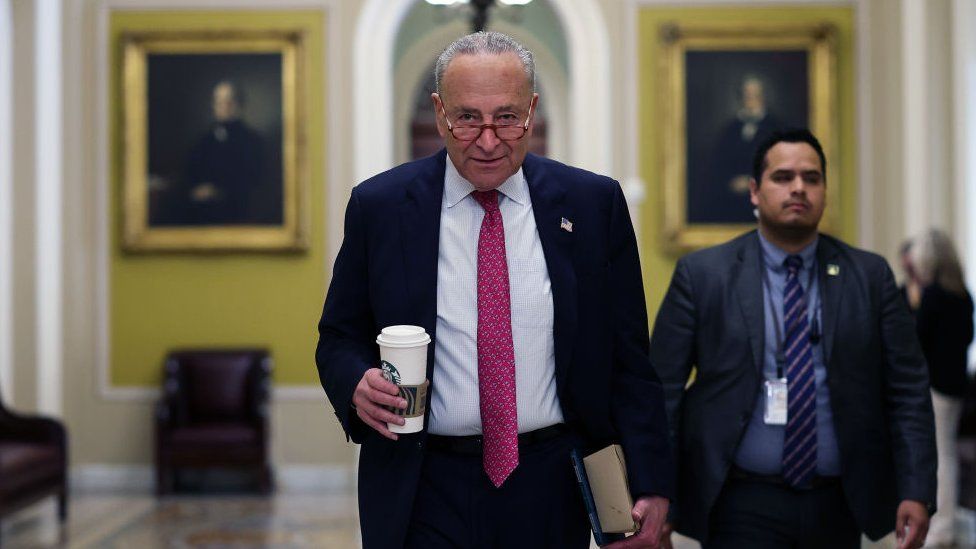ARTICLE AD BOX
 Image source, Getty Images
Image source, Getty Images
Senate Majority Leader Chuck Schumer said it is imperative that the US avoids a default on its debt
By Anthony Zurcher in Washington, DC, & Nadine Yousif
BBC News
The US Senate will move ahead with a vote on a bipartisan deal on Thursday that, if passed, will prevent the world's biggest economy from defaulting on its debt.
The debt ceiling deal passed the House of Representatives by a vote of 314-117, despite a few defections.
It now needs Senate approval before it can head to President Joe Biden's desk.
The deal must pass by Monday 5 June, but may face new challenges in the Senate from both sides of the aisle.
The 5 June deadline has left little margin for error as lawmakers race to avoid the US defaulting on its $31.4tn (£25tn) debt, which underpins the global financial system.
A default would mean the government could not borrow any more money or pay all of its bills. It would also threaten to wreak havoc on the global economy, affecting prices and mortgage rates in other countries.
Both Democrat and Republican leaders have said that they are keen to pass the deal through the Senate.
Democrat Majority Leader Chuck Schumer warned on Wednesday: "I cannot stress enough that we have no margin, no margin, for error."
Senate Republican leader Mitch McConnell told reporters that he will be "proud to support it without delay".
But it may face challenges in the upper chamber. Some Republicans have threatened to delay its consideration, and may call for amendments to the agreement if Senate leaders permit.
If any amendments are approved, the deal must head back to the House of Representatives for another vote, which would almost certainly push final approval past 5 June.
With the Senate narrowly divided - 51 seats out of 100 are held by Democrats - and with 60 votes required to approve most bills, some combination of Democratic and Republican votes will be needed.
On Wednesday evening, 165 Democrats joined 149 Republicans in approving the 99-page bill to raise the debt ceiling, allowing it to pass the House by the required simple majority.
With Republicans in control of the lower chamber of Congress and Democrats holding sway in the Senate and White House, a deal had proven elusive for weeks until Mr Biden and House Speaker Kevin McCarthy inked a compromise over the weekend.
Watch: The debt ceiling explained - in under 90 seconds
In a statement, Mr Biden thanked the speaker, saying he had negotiated in good faith.
"Neither side got everything it wanted," said the president. "That's the responsibility of governing."
The agreement suspends the debt ceiling, the spending limit set by Congress which determines how much money the government can borrow, until 1 January 2025.
The legislation would result in $1.5tn in savings over a decade, the independent Congressional Budget Office said on Tuesday.
But the bill's passage had been in jeopardy after lawmakers from both parties voiced opposition.
Hard-line Republicans complained they had secured too few concessions in exchange for raising the debt limit.
Republicans control the House by a narrow 222-213 majority, but Mr McCarthy was able to push the bill over the line with support from political centrists on both sides of the aisle.
He framed the package as "the biggest cut and savings this Congress has ever voted for".
One conservative Republican, Senator Mike Lee, has already threatened to use "every procedural tool" to stall consideration of the deal.
Left-wing Senator Bernie Sanders also came out against the bill on Wednesday, saying he cannot "in good conscience" support it - but he told CNN he would not delay its passage.
The last time the US came this close to overshooting its debt ceiling, in 2011, the credit agency Standard & Poor's downgraded the country's rating, a move that has yet to be reversed.

 1 year ago
18
1 year ago
18








 English (US)
English (US)